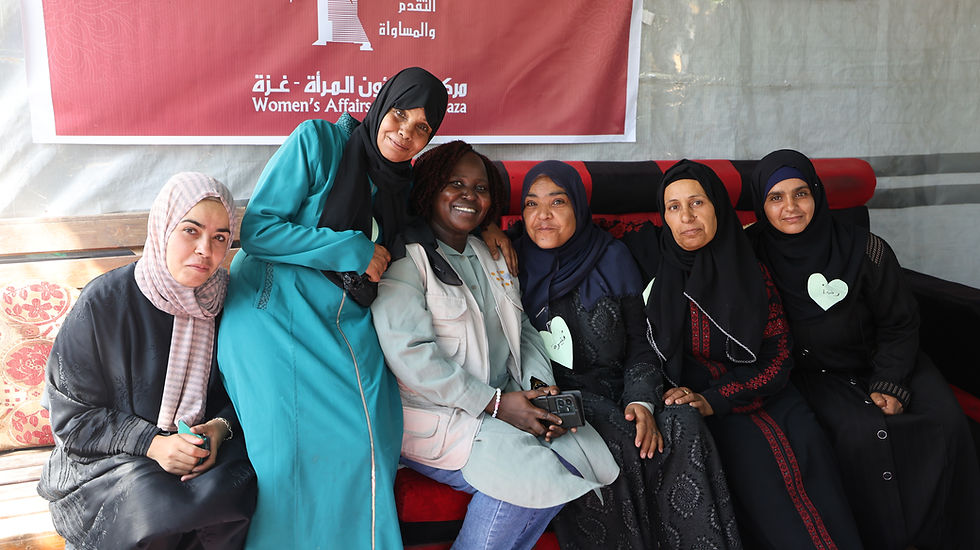Cholera Response in Malawi - the Role of an IPC Specialist During a Level 3 Emergency
- Standby Partnership Network

- Jun 8, 2023
- 4 min read
Highly skilled humanitarian professionals are called upon to help WHO's responses globally during an emergency. With funding from FCDO, CANADEM has deployed Rebecca Apolot, an Infection Prevention and Control (IPC) Specialist, to support the response to the Cholera Outbreak in Malawi. This article outlines the challenges faced in combating the outbreak and highlights Rebecca's invaluable efforts in coordinating and implementing crucial infection prevention measures.
A Glimpse into Malawi's Cholera Outbreak
Since March 2022, Malawi has been experiencing a widespread cholera outbreak, the deadliest outbreak in the country's history.
Deployed to support WHO's response operations in Lilongwe, Malawi, using the Stand-by Partner mechanism, Rebecca Apolot (pictured below), has been tirelessly working since January 2023 to ensure the Infection Protection and Control (IPC) priorities and activities in Malawi are managed effectively in compliance with the national standard operating procedures and WHO IPC guidelines.
Rebecca's days are demanding yet rewarding, and her dedication and commitment shine through her work. She engages in numerous meetings, offers mentorship and coordination, and performs vital background work involving checklists, standard operating procedures (SOPs), screening tools, and monitoring and evaluation (M&E) materials.

Empowering Stakeholders and Enhancing Coordination
One of Rebecca's critical roles in coordination is ensuring that all stakeholders are in sync and properly aligned with the IPC Response Plan, which she helped draft with the Ministry of Health (MOH) in Malawi when she first arrived. As a co-chair of IPC Pillar meetings, she facilitates weekly discussions with partners, introduces new IPC tools, and ensures everyone is on the same page. Rebecca's hands-on approach extends to conducting supportive supervision visits and providing mentorship to IPC Focal Points in Cholera Treatment Units (CTUs). She aims to empower them with the knowledge and skills to address crises in their respective contexts.
Since January 2023, Rebecca was able to develop various tools and materials that are now being implemented throughout the country.
"I am privileged to be part of this response. It feels good when you develop a tool, and colleagues and peers look at it, critique it, make it comprehensive, and the whole country is using it. It is an incredibly humbling experience for me."
Rebecca Apolot
"We needed support on IPC/WASH pillar technical and leadership in the country, and Rebecca has provided just that in this cholera response. She has worked so efficiently with the MOH and coordinated all IPC partners, and built capacity in country on IPC, developing training materials, training trainers, developing SOPs, and monitoring tools. We are so grateful for the support given to the Malawi WCO and the government of Malawi from the SBP desk through Rebecca."
Dr. Neema Rusibamayila Kimambo, WHO Country Representative in Malawi
Tools and Training for Widespread Impact
Within a short period, Rebecca has developed various tools and materials that are now being implemented throughout the country. Notably, she spearheaded a highly successful three-week cascade training program in collaboration with the Ministry of Health. The training, adapted from the World Health Emergencies Program Module on Preparedness, aimed to reach every corner of the country. Rebecca initially trained 30 pre-selected trainers from the Ministry of Health, who then cascaded their knowledge to 140 trainers from various Cholera Treatment Units (CTUs).
Concrete Impact: Screening Tool and IPC Checklist
Rebecca's innovative contributions include the creation of the "Screening Tool for Cholera." This user-friendly tool quickly identifies cholera symptoms at clinic entrances, ensuring prompt referral to CTUs and preventing further transmission. The Ministry of Health has already embraced this tool, which has previously been successfully implemented in refugee camps in Bangladesh in 2021. Additionally, Rebecca developed the "IPC Checklist," an essential resource adopted by the Ministry of Health, ensuring adherence to IPC SOPs in CTUs. This checklist allows for daily analysis of IPC practices, enhancing patient care and data-driven decision-making. The checklist is built in KoboToolbox. This way, the data team can do a daily analysis of IPC practices in different CTUs and have visibility on triage areas and how patients are being handled throughout the country.

A Collaborative Effort and a Lasting Legacy
When asked how she feels about her SBP deployment, Rebecca remarked that the Ministry of Health in Malawi and the IPC Focal Point Network have been very supportive, collaborative, and proactive in reviewing and adopting the IPC tools she created – from the national to the district level. Once her deployment ends, Rebecca will hand over her work to the National Officers she has recruited, led, and mentored throughout her assignment.
Rebecca Apolot is one of three experts deployed (along with the Information Management Officers and Partner Coordinator) currently through the SBP mechanism to Malawi to support the Cholera response. The World Health Organization (WHO) defines Cholera as an acute enteric infection caused by ingesting the bacteria Vibrio cholerae present in contaminated water or food. It is mainly linked to inadequate sanitation and insufficient access to safe drinking water. The large geographic spread and the high number of reported cases in the country are stretching all capacity to respond to the outbreak, increasing the risk of serious public health impact. The outbreak in Malawi is occurring against a backdrop of a surge in cholera outbreaks globally, which has constrained the availability of vaccines, tests, and treatments. The ongoing cholera outbreak was declared a public health emergency by the government of Malawi on December 05, 2022.





Comments